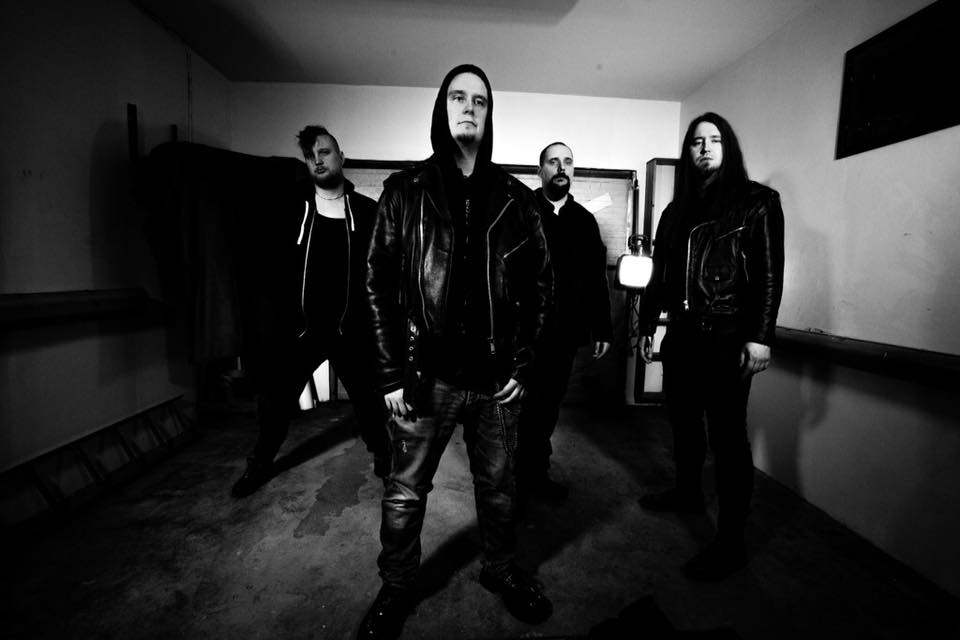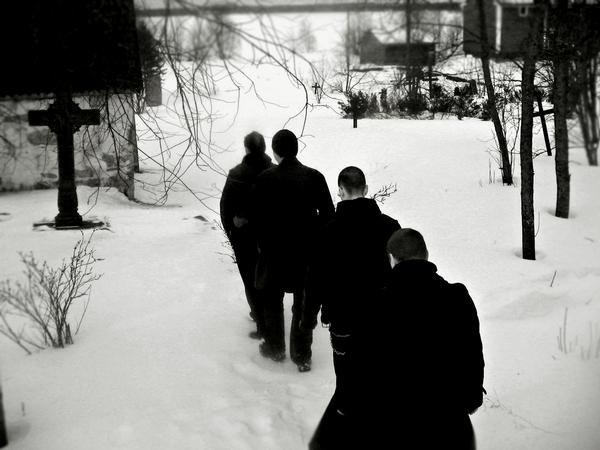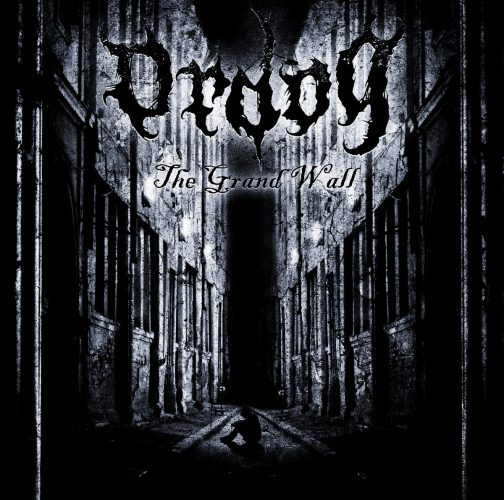(Comrade Aleks conducted the following interview with the two founding members of the Finnish death-doom band Ordog, who are at work on a new album.)
There are five bands in the metal scene who work under the name Ordog (which means “devil” in Hungarian), and there’s one death doom band against four others who play (or played) black metal stuff. This Ordog was born in Tornio, a Finnish town placed not far from the Swedish border. The band has been active for 12 years and it has grown from a duo to a five-man-strong crew. Despite anything they have continued to develop, to change, to move further.
Although I at first missed Ordog’s latest effort, The Grand Wall, (it was released almost a year ago), I made the decision to get in touch with the guys and learn how soon they plan to return with new stuff. Aleksi Martikainen (vocals, keyboards) and Valtteri Isometsä (guitars, bass, drums, vocals) were bloody swift and provided me answers in a few days. Hah, The Grand Wall is their fastest album, and not without reason…
******
Terve Aleksi! How are you man? I’ve checked the band’s Facebook profile and I saw that you started demoing Ordog’s sixth album in August. How far are you now?
Aleksi Martikainen: Hello, I am more than fine. Been busy with studies and Miseria Ultima. For the Ordog, the demoing process is now complete. We are steadily listening to the demos through and practicing. Taking some time off too.
I guess that when you have five albums in your discography, it’s not an easy task to develop the band further, keeping true to yourself and elaborating the sound and the concept at the same time. What can we expect from the next album?
Aleksi Martikainen: Everything comes out naturally, so the process has been rather “easy”. Of course development takes always time and work. In the next album we will have some more faster material, but also keeping it in doom-metal, of course.
What motivated you to make the next album faster? I guess that The Grand Wall was already the fastest album in your discography.
Valtteri Isometsä: Yes, there was quite a lot of fast material on The Grand Wall, but on the next album the fast stuff will be more sophisticated….or more irritating, I don’t know. This upcoming album will be like a hybrid between The Grand Wall and Remorse. So there’s lots of slow stuff too.
Aleksi, your second band Miseria Ultima performs absolutely different music. How do you separate these two bands, the energy you put into them?
Aleksi Martikainen: It is rather easy, another one is more active, but in other “musical circles”. I simply do both, when I am in the right mood for specific music.
Some of your albums were released by Violent Journey Records, and I guess that it’s a pretty big or at least old label. How did this collaboration actually help you to promote the band?
Aleksi Martikainen: VJR was an old label, and was based in Finland — not big, an indie label, but known here. The mutual deals and collaboration with VJR helped us of course a lot to promote our material — of course we needed to make promotion work ourselves, too, to get the music spread around.
What do you see as the necessary components of Ordog’s music? How is it natural to stay depressive for more than ten years? : )
Aleksi Martikainen: I feel that when making a darker-toned music, you enjoy your life more. All the anguish slowly pours into the music, so I think this has kept us going.
Ordog – Sundered
Aleksi, you recorded Crow And The Storm together with Valtteri Isometsä. Was it easier to work as a duo back then?
Aleksi Martikainen: As I think now, back in time to Crow and The Storm, it wasn’t as easy. There was more work for us both, me playing synths and singing, Valtteri doing rest. As for when Jussi joined the Ordog, the lineup was complete and the work was spread more equally among the members.
Valtteri Isometsä: We started Ordog as young lads. We’ve done music together from the late ’90s and we played thrash metal together in the early 2000s. So it was a natural thing to start this new musical project back in 2005.
The next two albums were done with new member Jussi Harju, who plays keyboards. Were Life Is Too Short For Learning To Live and Remorse recorded in a similar way? Or did three years long distance between them create significant differences?
Aleksi Martikainen: Yes, these both were recorded in a rather similar way — the first major change came with the fourth album Trail For The Broken. The changes came with the good and the bad aspects. A lot was learned, and a lot new was created 🙂
How did the band’s life change with the arrival of Ilkka Kalliainen, with whom you worked on Trail For The Broken?
Aleksi Martikainen: Ilkka had been a member in our past projects. Not much really changed — although, one change was major: we went to a completely different studio — and had a different approach. It worked in a way and didn’t work, haha.
Valtteri Isometsä: One of the major changes was when we played a few shows with him. We had no drummer for the shows, so Ilkka switched from bass to guitar and I played the drums. It was great to have such a versatile musician in the band. That was also when we invited our previous bass player Olli-Pekka Rissanen back to the band.
But what were the “bad aspects” of the changes you mentioned before?
Valtteri Isometsä: It was different for us to work this way. We had done our first three albums completely on our own, I’d done all the engineering and mixing by myself and had a vision of the big picture. So when we chose to work with the guy outside of the band it was a new thing, and there were some things I would have done differently in the recording process. But of course Ilkka is a professional sound technician and we appreciate his input for the band. He also joined the band in the middle of the recording sessions and played bass on the album.
The Grand Wall was recorded in Sweden. Was that only because of your town Tornio’s location near the Finnish border? How did this recording session differ from those you had before?
Aleksi Martikainen: Yep, this is true. It was close to our hometown and was easily accessible for us to make a record. We knew also that the studio in Sweden was known for its good quality.
This was the first time when we made an album as a whole band, and we had Antti Lindholm, the recording guy, as a producer too. Giving his views and thoughts.
Did Antti have a lot of influence on Ordog’s sound? What kind of ideas did he offer you for The Grand Wall? How many of them did you accept?
Valtteri Isometsä: He did a great job, and the album sounds fantastic. He also had some good ideas for guitar so I played some E-bow and we tried different sound effects on solos and rhythm guitar parts. We are open for ideas and we want to try new things. Some of them were included and some weren’t.
Will you return to the same studio for the new album? What kind of results do you want to achieve this time?
Valtteri Isometsä: That’s our intention. We were really satisfied with The Grand Wall. Now we know better the way Antti works, so it will be even more easy to work with him on the next album.
The band was born in 2006, and there are ten years between Ordog’s debut Crow And The Storm and your latest record The Grand Wall. How do you see the core differences between these albums?
Aleksi Martikainen: Almost everything has changed, we are more into our “own sound”. The material is a little bit faster nowadays, but it still has this original sound too, I mean from the first album. The lyrics have slightly changed to become more introspective, and there are more melodies. Things have been thought through more thoroughly.
Ordog – The Perfect Cut
You have two new members on The Grand Wall. How did you find them? It seems that it has never been a problem to add new blood to Ordog despite the fact that death doom isn’t the most popular genre in the metal world.
Aleksi Martikainen: Olli-Pekka had played with us in the Russia tour in 2009. Also he made a lot of other lives with us, so he was a natural choice for our band. Also, Tapio too, we knew he was a doom-metal fan, and has a long history in playing in different metal bands. We knew him since we were teens, and asked him to join. Most of us are connected through past music projects too.
How did it happen that this album was released on the Russian label Moscow Funeral League? Are you satisfied with this collaboration?
Aleksi Martikainen: We are more than happy with the collaboration. MFL and the companions made more than great work with the promotion, releasing, and with everything. More than great people. 🙂 We knew that MFL had released material from bands like My Shameful, and we also knew that these guys enjoy doom-metal. We shared the same thoughts and we inked a deal with them.
The Grand Wall sounds more dynamic and aggressive than Trail For The Broken. How natural were these changes in the band’s sound? What was your main goal when you composed this material?
Aleksi Martikainen: Everything came naturally, slowly but surely. Making lyrics and creating something new. We always have wanted to advance our sound. Valtteri knows more about composing.
Valtteri Isometsä: Composing music for the albums always differs a bit. The material depends on the feelings at the moment of writing. Songs for Trail For The Broken were written over around two years of time, and The Grand Wall album was written within three or four months, so that also gives a different feeling to the overall sound of the album. But the main reason why Trail For The Broken sounds more mellow compared to The Grand Wall was the way we produced the vocals. There was a lot more clean singing than growling. That felt right for us to do at the time.
What meaning did you put into the name of this album? What’s your lyrical message?
Aleksi Martikainen: It is a metaphor, for a wall which you cannot overrun. It is the “final one” — death. The lyrics move in self-reflection and in introspection, but of course there are still thematic elements included like sorrow, death, hatred, and so on.
I remember that about five or six years ago Ordog played in Saint-Petersburg and Moscow, and that was big fun! How often do you play live nowadays? Which bands do you make your company on gigs?
Aleksi Martikainen: It was more than great! Nowadays we play rather infrequently. It is because we all have our hurries in personal life and different things to concentrate on, in addition to music. We have had random bands on our gigs, never the same. One to mention of course is Throes of Dawn 🙂
Valtteri Isometsä: Actually it’s nearly 9 years ago when we played in Moscow and Saint-Petersburg. Time flies.
https://www.facebook.com/ordogband
https://ordogband.bandcamp.com



